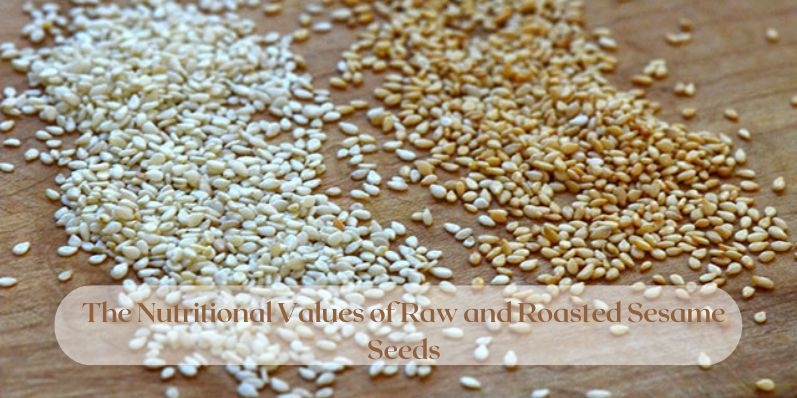
18-09-2023
The Nutritional Values of Raw and Roasted Sesame Seeds
- Admin
Sesame seeds have been cultivated and consumed for thousands of years, valued not only for their rich, nutty flavor but also for their impressive nutritional profile. These tiny seeds, often used in a variety of culinary dishes, come in two primary forms: raw and roasted. Both types of sesame seeds offer unique nutritional benefits, and choosing between them can depend on your taste preference and dietary needs.
Raw Sesame Seeds:
Raw sesame seeds are tiny, flat, and pale in color, ranging from off-white to light tan. They are commonly used in baking, sprinkled on salads, and as an ingredient in various dishes. Here is a list of each food's nutritional values.:
Protein: Raw sesame seeds are a fantastic source of plant-based protein, with roughly 4.7 grams of protein per ounce (28 grams). They are a great complement to vegetarian and vegan diets because of this.
Fiber: These seeds are rich in dietary fiber, which aids digestion and promotes a feeling of fullness. An ounce of raw sesame seeds contains approximately 3.3 grams of fiber.
Healthy Fats: Sesame seeds are a good source of healthy fats, primarily monounsaturated and polyunsaturated fats. These fats are essential for overall health and help in nutrient absorption.
Minerals: Raw sesame seeds are packed with essential minerals, including calcium, magnesium, phosphorus, and iron. Just one ounce provides about 35% of your daily recommended intake of calcium.
Vitamins: They also contain several B vitamins, such as niacin, thiamine, and riboflavin, which play vital roles in energy metabolism and overall health.
Antioxidants: Sesame seeds contain antioxidants like sesamin and sesamol, which can help protect your cells from oxidative damage.
Roasted Sesame Seeds:
Roasting sesame seeds not only enhances their flavor but also alters their nutritional content. Here's how roasted sesame seeds compare to their raw counterparts:
Fat Content: Roasted sesame seeds have slightly higher fat content due to the roasting process, but these fats are still predominantly healthy fats.
Flavor: Roasting sesame seeds intensifies their nutty flavor, making them a popular choice for culinary applications, especially as a topping for sushi rolls and Asian dishes.
Calcium: Roasted sesame seeds retain their calcium content, making them an excellent source of this mineral for bone health.
Iron: The iron content may be slightly reduced in roasted sesame seeds compared to raw ones, but they still contribute to your daily iron intake.
Antioxidants: The roasting process does not significantly affect the antioxidant content of sesame seeds, so you can still benefit from their antioxidant properties.
Sesame Seeds: How to Include Them in Your Diet:
Both raw and roasted sesame seeds can be a valuable addition to your diet. Here are a few delectable ways to use them:
Sesame Tahini: Blend raw or roasted sesame seeds into a creamy tahini paste, which is a key ingredient in hummus and many salad dressings.
Baking: Sprinkle sesame seeds on bread, rolls, or cookies before baking for added texture and flavor.
Sushi Topping: Use roasted sesame seeds as a topping for sushi rolls to add a delightful crunch.
Salads: Sprinkle sesame seeds on salads for extra nutrition and a nutty taste.
Stir-Fries: Add sesame seeds to stir-fries and Asian-inspired dishes for a burst of flavor and nutrition.
In conclusion, both raw and roasted sesame seeds offer impressive nutritional values, with raw seeds providing slightly more nutrients in their natural state. However, roasted sesame seeds can be a flavorful and nutritious addition to various dishes. Incorporating these tiny seeds into your diet can enhance the overall nutritional quality of your meals while adding a delightful nutty flavor to your culinary creations. Whether you choose raw or roasted, sesame seeds are a wholesome addition to a healthy and balanced diet.